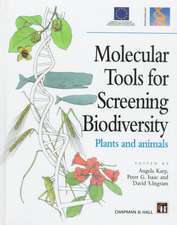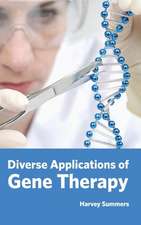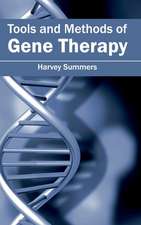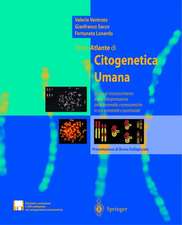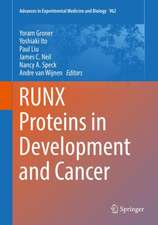Introduction to Molecular Embryology: Heidelberg Science Library
Autor Jean Brachet, Henri Alexandreen Limba Engleză Paperback – noi 1986
Din seria Heidelberg Science Library
- 18%
 Preț: 877.25 lei
Preț: 877.25 lei - 20%
 Preț: 324.31 lei
Preț: 324.31 lei - 15%
 Preț: 529.28 lei
Preț: 529.28 lei -
 Preț: 381.43 lei
Preț: 381.43 lei -
 Preț: 378.92 lei
Preț: 378.92 lei -
 Preț: 379.48 lei
Preț: 379.48 lei - 20%
 Preț: 440.78 lei
Preț: 440.78 lei - 15%
 Preț: 635.80 lei
Preț: 635.80 lei - 5%
 Preț: 361.23 lei
Preț: 361.23 lei - 20%
 Preț: 322.68 lei
Preț: 322.68 lei -
 Preț: 384.86 lei
Preț: 384.86 lei - 5%
 Preț: 359.78 lei
Preț: 359.78 lei - 5%
 Preț: 361.23 lei
Preț: 361.23 lei -
 Preț: 383.33 lei
Preț: 383.33 lei -
 Preț: 380.25 lei
Preț: 380.25 lei -
 Preț: 384.48 lei
Preț: 384.48 lei -
 Preț: 385.62 lei
Preț: 385.62 lei -
 Preț: 385.08 lei
Preț: 385.08 lei - 15%
 Preț: 632.37 lei
Preț: 632.37 lei -
 Preț: 389.70 lei
Preț: 389.70 lei -
 Preț: 379.09 lei
Preț: 379.09 lei - 15%
 Preț: 580.46 lei
Preț: 580.46 lei -
 Preț: 381.81 lei
Preț: 381.81 lei
Preț: 365.82 lei
Preț vechi: 385.08 lei
-5% Nou
Puncte Express: 549
Preț estimativ în valută:
70.01€ • 76.02$ • 58.81£
70.01€ • 76.02$ • 58.81£
Carte tipărită la comandă
Livrare economică 23 aprilie-07 mai
Preluare comenzi: 021 569.72.76
Specificații
ISBN-13: 9783540169680
ISBN-10: 3540169687
Pagini: 244
Ilustrații: XIV, 229 p. 53 illus.
Dimensiuni: 155 x 235 x 13 mm
Greutate: 0.35 kg
Ediția:2nd totally rev. and enlarged ed.
Editura: Springer Berlin, Heidelberg
Colecția Springer
Seria Heidelberg Science Library
Locul publicării:Berlin, Heidelberg, Germany
ISBN-10: 3540169687
Pagini: 244
Ilustrații: XIV, 229 p. 53 illus.
Dimensiuni: 155 x 235 x 13 mm
Greutate: 0.35 kg
Ediția:2nd totally rev. and enlarged ed.
Editura: Springer Berlin, Heidelberg
Colecția Springer
Seria Heidelberg Science Library
Locul publicării:Berlin, Heidelberg, Germany
Public țintă
ResearchCuprins
I From Descriptive to Molecular Embryology.- II How Genes Direct the Synthesis of Specific Proteins in Living Cells.- III How Eggs and Embryos Are Made.- 1 Theories of Embryonic Differentiation.- IV Gametogenesis and Maturation: The Formation of Eggs and Spermatozoa.- 1 Oogenesis.- 2 Maturation of Xenopus Oocytes.- 3 Spermatogenesis.- V Fertilization: How the Sleeping Egg Awakes.- 1 General Outlook.- 2 The Fertilizin Problem.- 3 Physical and Chemical Changes at Fertilization.- 4 Nucleic Acid and Protein Synthesis.- 5 Parthenogenetic Activation.- 6 Molecular Embryology and Classical Theories of Fertilization.- VI Egg Cleavage: A Story of Cell Division.- 1 General Outlook.- 2 The Biochemistry of Cleavage.- VII Molecular Embryology of Invertebrate Eggs.- 1 Chaetopterus Eggs.- 2 Mollusk Eggs.- 3 Tunicate (Ascidian) Eggs.- 4 Insect Eggs.- 5 Sea Urchins.- VIII Molecular Embryology of Amphibian Eggs.- 1 Respiration of the Amphibian Gastrula and Neurula.- 2 The Nature of the Inducing Substance.- 3 RNA Localization and Synthesis.- 4 The Links Between RNA Synthesis and Morphogenesis.- 5 Size and Mode of Action of the Inducing Agent.- 6 Molecular Basis of Cell Movements.- IX Molecular Embryology of Mammals.- 1 The Biology of Mammalian Sperm.- 2 Molecular Embryology of Mammalian Eggs.- 3 Experimental Embryology of the Preimplantation Stages.- 4 Early Postimplantation Stages.- 5 Interspecific Hybrids and Chimaeras.- X Biochemical Interactions Between the Nucleus and the Cytoplasm During Morphogenesis.- 1 Biology and Biochemistry of the Alga Acetabularia.- 2 Biochemistry of Anucleate Fragments of Eggs.- 3 The Importance of the Nucleus for Embryonic Development.- 4 Biochemistry of Early Developmental Mutants.- 5 “Transgenic” Mice and Teratocarcinoma.- 6 Conclusions.- XI How Cells Differentiate.- 1 General Introduction.- 2 Specific Properties of Cell Membranes.- 3 Effects of Tissue Extracts on Cell Differentiation.- 4 Immunological Studies on Embryonic Differentiation.- 5 Enzyme Synthesis and Embryonic Differentiation.- 6 Differentiation of Cultured Embryonic Cells.- 7 Embryonic Differentiation and Cancer.- 8 The Future of Molecular Embryology.- References.- Further Reading.- Author and Subject Index.





